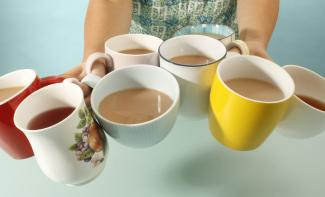
Do the preparation task first. Then read the article and do the exercises.
Preparation
If you've ever spent time in the UK, you'll surely have had a nice 'cuppa'. There's tea for breakfast, tea during break time, tea when visiting a friend's house, tea to wake up, tea to relax ... you get the idea. Tea even gets its very own special day in the UK, 21 April.
Is the UK the 'capital' of tea?
In short, no. While drinking tea is certainly a centuries-old tradition in the UK, many countries have their own strong cultural practices involving tea. The nation which drinks most tea is Turkey, where a 2013 survey showed that people drank an average of ten cups a day! This was followed by Ireland, with the UK coming in third place. Other countries with an obsession with tea include Iran, Russia and Morocco. It is also a popular drink in China and India, where most of the world's tea is grown.
What do the British consider to be tea?
Many forms of tea exist around the world. Green tea is popular in China and Japan. In India, tea is often prepared with spices and boiled in both water and milk, and Tibetans commonly drink tea with butter and salt. In the UK, tea is typically a variety of black tea and can be prepared with loose tea or teabags. It is made with boiling water, allowed to brew for about five minutes and then mixed with a little milk (and possibly some sugar). And thus, the perfect British cuppa is ready!
Milk: before or after the tea?
Despite the fact that tea has been popular in the UK for hundreds of years, the question of when to add the milk is one which still provokes many an argument! Most people first pour the tea into the cup, then add the milk, but others disagree. It is said that this was a way for the rich to show off their wealth. They often drank tea in porcelain cups, and it was only the better-quality porcelain that could withstand the temperature of very hot tea. This meant that people who had lower-quality cups needed to first pour the milk so that the cup wouldn't break.
What is a tea party?
Many cultures have traditions of people meeting to sit together and drink tea. For example, Japanese tea ceremonies can be formal, elegant affairs which last for hours. In the UK, such gatherings range from formal to very informal. The most famous British 'tea' stereotype is probably afternoon tea, where people dress formally and meet in hotels or cafés to enjoy tea and cakes, all served on beautiful fine porcelain. Nowadays, going out for a formal afternoon tea is rare, and people will more often simply have a nice cup of tea and some biscuits with friends or family, catching up round the kitchen table.
What happens on National Tea Day?
On 21 April, tea parties are held in cafés, pubs, hotels and tea rooms across the UK. Many of these events aim to encourage people to try different varieties of tea and to appreciate how drinking it with others can enrich their lives. Some of these events also promote sustainably produced tea and better prices and working conditions for farmers, while others raise funds for different charities from the sales. However people observe this special day, it's about appreciating the opportunity that sharing a cup of tea gives to people to connect with one another.
Want to know more about tea celebrations this April? Search for #NationalTeaDay on social media. And remember, tea-drinking isn't just for April – it's always the right time for a delicious cuppa.
Discussion
Language level
- Log in or register to post comments
- Log in or register to post comments
- Log in or register to post comments
- Log in or register to post comments
- Log in or register to post comments
- Log in or register to post comments
- Log in or register to post comments
- Log in or register to post comments
- Log in or register to post comments
- Log in or register to post comments



